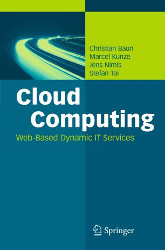|
|
 |
A distributed system consists of several independent computers that communicate with each other over a network. Different distributed system architectures exist in the computer science. The most popular architecture is the Client-Server model. But especially in the parallel computing field, exist among others, Cluster Computing and Cloud Computing. In this course, the fundamentals of Cloud Computing and related technologies are discussed. Practical exercises are an important part of this course because they are essential for thee understanding of these technologies. Parts of the slide sets are based on the book Cloud Computing: Web-Based Dynamic IT Services, which was published in 2011 by Springer. ISBN: 978-3-642-20916-1 This course has no written exam! Instead, your grade will depend 100% on your work and the results of the semester project. In previous semesters, each group had worked on completely different themes. This semester, all groups will work on one overarching theme. The semester project in SS2023 has the goal to develop an edge computing solution for the automatic detection of pets (cats, dogs, golden hamster). The semester project includes:
The requirements will be collected in class, discussed, and distributed among the individual teams on April 12th. We will try to design and assign the tasks so that the failure of individual team members and teams does not lead to the collapse of the overall project. It is very important that all participants of the module attend class on the 12th of April! |
| Date | Time | Room | Event | Topics |
|---|---|---|---|---|
| 12.04.2023 | 10:00-11:30 | 1-234 | Semester Project | Semester project introduction, project planing, team building, groups formation |
| 11:45-13:15 | 1-234 | Semester Project | Requirement analysis, task identification, interface specification, time planing | |
| 19.04.2023 | 10:00-11:30 | 1-234 | Lecture | Discussion of slide set 1 (slide 1-36) |
| 11:45-13:15 | 1-234 | Semester Project | Teams work for the semester project | |
| 26.04.2023 | ----- | ----- | ----- | |
| 03.05.2023 | 10:00-11:30 | 1-234 | Lecture | Discussion of slide set 1 (slide 37-57) |
| 11:45-13:15 | 1-234 | Semester Project | Presentations of all groups, planing of next steps and tasks | |
| 10.05.2023 | 10:00-11:30 | 1-234 | Lecture | Discussion of slide set 1 (slide 58-66) and slide set 2 (slide 1-12) |
| 11:45-13:15 | 1-234 | Semester Project | Teams work for the semester project | |
| 17.05.2023 | 10:00-11:30 | 1-234 | Lecture | Discussion of slide set 2 (slide 13-38) |
| 11:45-13:15 | 1-234 | Semester Project | Teams work for the semester project | |
| 24.05.2023 | 10:00-11:30 | 1-234 | Lecture | Discussion of slide set 3 (slide 1-30) |
| 11:45-13:15 | 1-234 | Semester Project | Teams work for the semester project | |
| 31.05.2023 | Teams work for the semester project | |||
| Teams work for the semester project | ||||
| 07.06.2023 | 10:00-11:30 | 1-234 | Lecture | Guest lecture from envite: Green Cloud Computing |
| 11:45-13:15 | 1-234 | Semester Project | Teams work for the semester project | |
| 14.06.2023 | 10:00-11:30 | 1-234 | Lecture | Presentations of all groups |
| 11:45-13:15 | 1-234 | Semester Project | Teams work for the semester project | |
| 21.06.2023 | 10:00-11:30 | 1-234 | Lecture | Guest lecture from Claranet: Cloud Native - the Next Evolution of Abstracting Away Infrastructure |
| 11:45-13:15 | 1-234 | Semester Project | Teams work for the semester project | 28.06.2023 | 10:00-11:30 | 1-234 | Lecture | Guest lecture from Thinkport: Event Streaming with Apache Kafka |
| 11:45-13:15 | 1-234 | Semester Project | Teams work for the semester project | |
| 05.07.2023 | ----- | ----- | ----- | Faculty Day at our University (2nd attempt) |
| 12.07.2023 | ----- | ----- | ----- | This lecture and exercise cannot take place due to a business trip |
| 19.07.2023 | 10:00-10:50 | 1-130 | Presentation | Semester project presentation of team 3 |
| 19.07.2023 | 10:55-11:50 | 1-130 | Presentation | Semester project presentation of team 5 |
| 19.07.2023 | 15:00-15:45 | 1-130 | Presentation | Semester project presentation of team 7 |
| 19.07.2023 | 15:45-16:45 | 1-130 | Presentation | Semester project presentation of team 2 |
| 19.07.2023 | 16:45-17:45 | 1-237 | Presentation | Semester project presentation of team 1 |
| 21.07.2023 | 10:00-11:00 | 1-235 | Presentation | Semester project presentation of team 4 |
| 21.07.2023 | 11:00-12:00 | 1-235 | Presentation | Semester project presentation of team 6 |
| Slide sets | Exercise sheets | Solutions | Topics |
|---|---|---|---|
| Slide set 1 | Exercise sheet 1 | Solution | Organisational information, Client-Server, Fundamentals, Laws and Limitations, Parallel Computers |
| Slide set 2 | Exercise sheet 2 | Solution | Cluster Computing |
| Slide set 3 | Cloud Computing, Services and Concepts, Opportunities and Risks | ||
| Guest lecture | Green Cloud Computing (envite) | ||
| Guest lecture | Green Cloud Computing (Claranet) | ||
| Guest lecture | Event Streaming with Apache Kafka (Thinkport) |
| Team | Documentation | Slides | Source Code |
|---|---|---|---|
| 1 | GitHub | ||
| 2 | GitHub | ||
| 3 | GitHub | ||
| 4 | GitHub | ||
| 5 | GitHub | ||
| 6 | GitHub | ||
| 7 | GitHub |
| Result of the evaluation |
The best way to reach me is via email: christianbaun@fb2.fra-uas.de
|
Prof. Dr. Christian Baun Frankfurt University of Applied Sciences (1971-2014: Fachhochschule Frankfurt am Main) Faculty of Computer Science and Engineering Last updated: July 12th, 2023 |